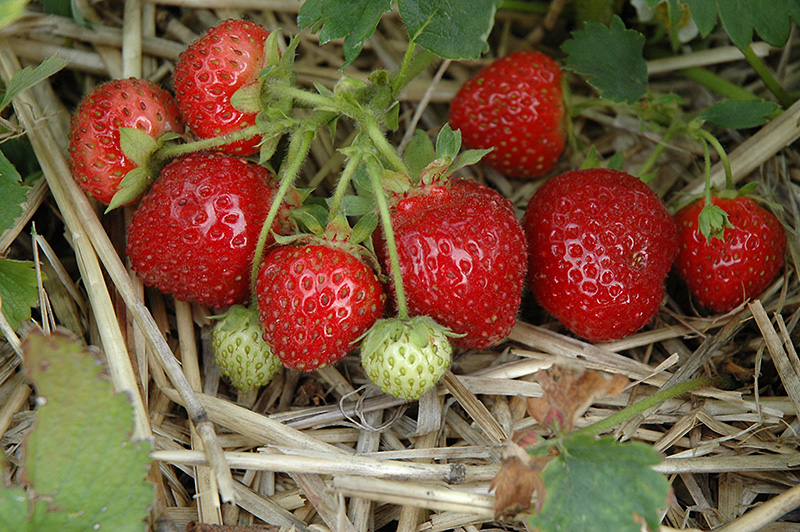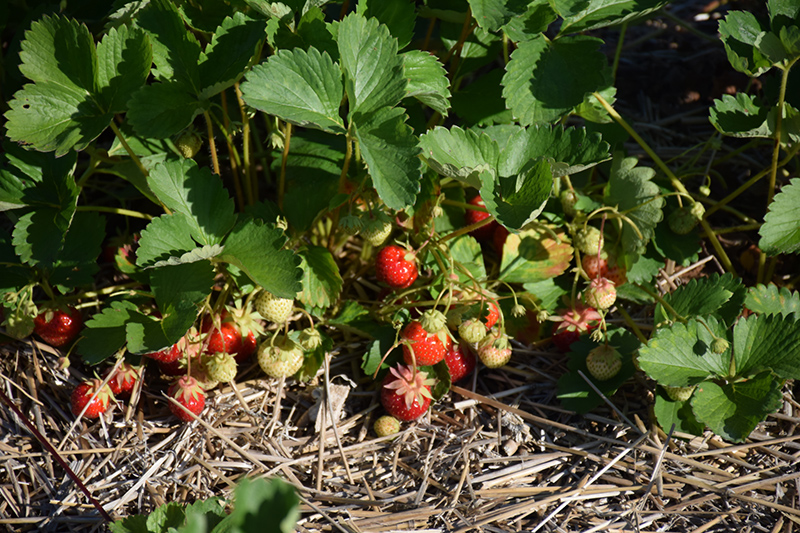>> Home
Height: 8 inches
Spread: 24 inches
Sunlight:
![]()
![]()
Hardiness Zone: 4
Other Names: Garden Strawberry
Group/Class: June-Bearing
Description:
This variety produces a yield of large, juicy red berries with outstanding quality and flavor in late spring; vigorous, winter hardy, and shows good disease resistance
Edible Qualities
Jewel Strawberry is a perennial that is commonly grown for its edible qualities. It produces large red heart-shaped berries which are usually ready for picking from late spring to mid summer. This variety is considered a 'June-bearing' type of strawberry, which means that it produces one big crop of fruit at the same time. The berries have a sweet taste and a firm texture.
The berries are most often used in the following ways:
- Fresh Eating
- Baking
- Preserves
Features & Attributes
Jewel Strawberry features dainty white cup-shaped flowers with lemon yellow eyes along the stems from mid to late spring. Its serrated round compound leaves remain dark green in color throughout the season. It features an abundance of magnificent red berries in early summer.
This is an open herbaceous perennial with a spreading, ground-hugging habit of growth. Its relatively fine texture sets it apart from other garden plants with less refined foliage. This is a high maintenance plant that will require regular care and upkeep, and should not require much pruning, except when necessary, such as to remove dieback. It is a good choice for attracting birds to your yard, but is not particularly attractive to deer who tend to leave it alone in favor of tastier treats. Gardeners should be aware of the following characteristic(s) that may warrant special consideration;
- Spreading
Aside from its primary use as an edible, Jewel Strawberry is sutiable for the following landscape applications;
- Border Edging
- General Garden Use
- Groundcover
- Container Planting
Planting & Growing
Jewel Strawberry will grow to be about 8 inches tall at maturity, with a spread of 24 inches. It grows at a fast rate, and under ideal conditions can be expected to live for approximately 10 years. As an herbaceous perennial, this plant will usually die back to the crown each winter, and will regrow from the base each spring. Be careful not to disturb the crown in late winter when it may not be readily seen! This is a self-pollinating variety, so it doesn't require a second plant nearby to set fruit.
This plant is typically grown in a designated edibles garden. It does best in full sun to partial shade. It does best in average to evenly moist conditions, but will not tolerate standing water. It may require supplemental watering during periods of drought or extended heat. It is particular about its soil conditions, with a strong preference for rich, alkaline soils. It is somewhat tolerant of urban pollution. Consider applying a thick mulch around the root zone in both summer and winter to conserve soil moisture and protect it in exposed locations or colder microclimates. This particular variety is an interspecific hybrid. It can be propagated by division; however, as a cultivated variety, be aware that it may be subject to certain restrictions or prohibitions on propagation.
Jewel Strawberry is a good choice for the edible garden, but it is also well-suited for use in outdoor pots and containers. Because of its spreading habit of growth, it is ideally suited for use as a 'spiller' in the 'spiller-thriller-filler' container combination; plant it near the edges where it can spill gracefully over the pot. Note that when growing plants in outdoor containers and baskets, they may require more frequent waterings than they would in the yard or garden.

